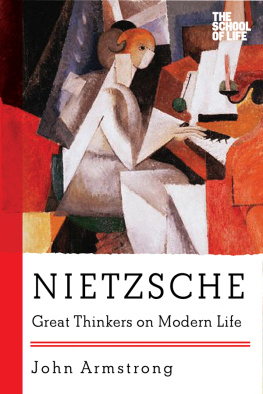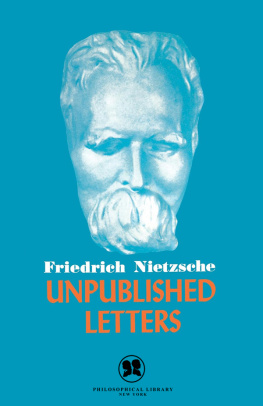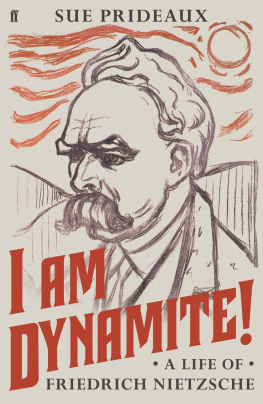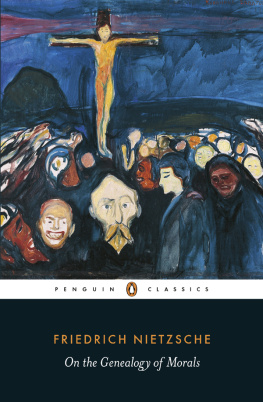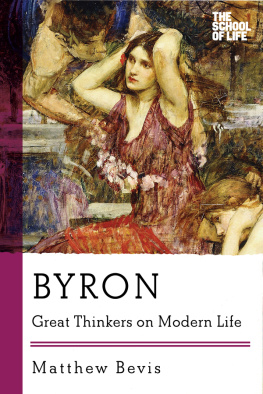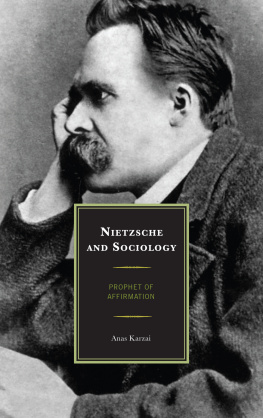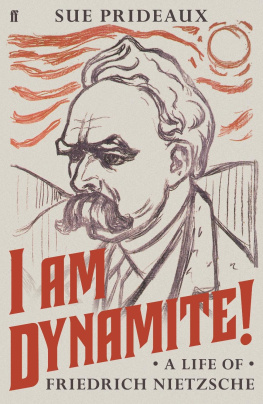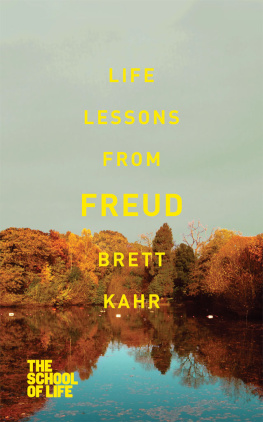
THE SCHOOL OF LIFE is dedicated to exploring lifes big questions: How can we fulfil our potential? Can work be inspiring? Why does community matter? Can relationships last a lifetime? We dont have all the answers, but we will direct you towards a variety of useful ideas from philosophy to literature, psychology to the visual arts that are guaranteed to stimulate, provoke, nourish and console.

THESCHOOLOFLIFE.COM
By the same author:
Conditions of Love
How to Worry Less About Money
In Search of Civilization
Love, Life, Goethe
The Secret Power of Beauty
By Friedrich Nietzsche:
Beyond Good and Evil
David Strauss, the Confessor and the Writer
Human, All Too Human
On the Genealogy of Morality
On the Uses and Disadvantages of History for Life
Richard Wagner in Bayreuth
Schopenhauer as Educator
The Birth of Tragedy
The Case of Wagner
The Gay Science Twilight of the Idols
NIETZSCHE
Great Thinkers on Modern Life
John Armstrong

NIETZSCHE
Pegasus Books LLC
80 Broad Street, 5th Floor
New York, NY 10004
Copyright 2015 by John Armstrong
First Pegasus Books edition 2015
All rights reserved. No part of this book may be reproduced in whole or in part without written permission from the publisher, except by reviewers who may quote brief excerpts in connection with a review in a newspaper, magazine, or electronic publication; nor may any part of this book be reproduced, stored in a retrieval system, or transmitted in any form or by any means electronic, mechanical, photocopying, recording, or other, without written permission from the publisher.
ISBN: 978-1-60598-675-3
ISBN: 978-1-60598-741-5 (e-book)
Distributed by W. W. Norton & Company, Inc.
CONTENTS
No one is born with the ability to say Nietzsche. One way is to remember that Nietzsche rhymes with teach ya as memorably demonstrated in Monty Pythons philosophers drinking song.
Friedrich Nietzsche (18441900) was one of the most daring and ambitious thinkers of the nineteenth century. He felt that the prevailing values of his society were obstacles to the good life and launched a one-man revolution to transform pretty much everything. He particularly relished attacking what he regarded as conventional pieties or reversing our expectations: he decides, for example, that pity might not always be a good thing or that loneliness is good for us. He likes taking risks and hes not afraid of shocking us.
Nietzsche was born into a deeply religious family (his father, uncle and grandfather were all pastors). He was an extremely conscientious schoolboy and student, especially good at Greek. He so impressed his teachers that in his mid-twenties he was appointed professor of classics at the small University of Basle.
Around the age of twenty he lost his religious faith, arriving at the conclusion that there was no adequate evidence for the existence of God. He became, in some ways, deeply hostile to Christianity. In fact, he seems to have been irritated by almost every aspect of German culture as it then was. But although he was shy and lacking in self-confidence, Nietzsche was filled with a longing to speak intently into the lives of others and to help them in their deepest spiritual needs.
Just as his academic career was taking off he became close friends with Germanys foremost cultural figure, the composer Richard Wagner. Wagner wanted to transform the imaginative life of Europe and Nietzsche was fired with equally grand ideas. He soon felt constrained by the careful, cautious limits of academic life.
In 1870 (when Nietzsche was twenty-six) the recently unified, rapidly industrializing Germany waged a very successful war against France. Nietzsche served as a medical orderly. Under the strategic leadership of Bismarck, Germany entered a period of immense self-confidence and collective pride. This was extremely upsetting to Nietzsche. All his dislike and frustration and contempt for the people around him seemed defeated by their all too obvious material and political triumphs. Its very hard to get much response when you criticize people who think themselves amazingly successful.
In 1879, after a few years of teaching at Basle, Nietzsche retired on a small pension paid by the university. His health was precarious. He spent much time in Italy and Switzerland, often in small towns, living quietly and alone. He broke with Wagner and came to see his former mentor as a symptom of the very spiritual sickness that needed curing.
For a while Nietzsche thought of marriage and family life, but he felt terribly betrayed in his closest relationships with women. His craving for ideal friendship was unsatisfied. But, crucially, he did not repudiate the things he wanted simply because he was unable to attain them himself.
All his life, even though he was single, he believed that marriage could be wonderful. He also believed, despite his lack of both, that power and fame were tremendous honours and great resources. He held good health in the highest esteem, as central to the good life, even though he was frequently ill. He believed in the value of a life of action, despite being cooped up in small lodgings, poring over his books. He asserted the importance of strong, healthy instincts, which he regarded as far more important than his own special skill the acquisition of scholarly knowledge.
Living often alone, in poor health, short of money, Nietzsche wrote a sequence of books that have made him one of the founding figures of the modern world of ideas. But at the time few were paying attention, and he was deeply wounded by the lack of interest his contemporaries showed in his ideas. But somehow he overcame this, to use one of his favourite terms. Instead of giving up he devoted incredible energy and fertility of mind to the elaboration of views that for many years mattered only to him.
In 1889 while he was living in Turin, delighting in the golden autumnal weather and going repeatedly to the opera house to hear performances of Bizets Carmen, he saw a horse being beaten by its driver. He rushed towards the horse shouting: I understand, I understand. He then collapsed and was taken back to his inn.
For the rest of his life he was in the grip of intense delusions. He was sent back to Germany to live with his sister whom he had disliked and distrusted. She established him as a seer he grew a long white beard and sat robed in a white toga. She and her husband edited Nietzsches works so as to align them with German Nationalism and the glorification of military power, grotesquely distorting his clearest intentions. Nietzsche loathed all groups; he was entirely devoted to cultivating the strength and wisdom of individuals.
While suffering from pneumonia he died of a stroke at the end of August 1900.
Trying to do the impossible and sum up his lifes work in a single phrase, Nietzsche said that he wanted to bring about the re-evaluation of all values. Its a striking phrase. But what does it mean?
Nietzsche believed that values are the central concern in life: What do you love? What do you think is important? What do you give priority to? What do you take seriously in your life and what do you brush aside as irrelevant? This is not just a matter of what you say or what you tell yourself that you believe. It is played out in conduct, habit and choices. Someone may say that they care about global justice, but in their day-to-day life this does not actually take centre stage. Values should be lived out in our lives and should shape every aspect of our existence.
Next page
